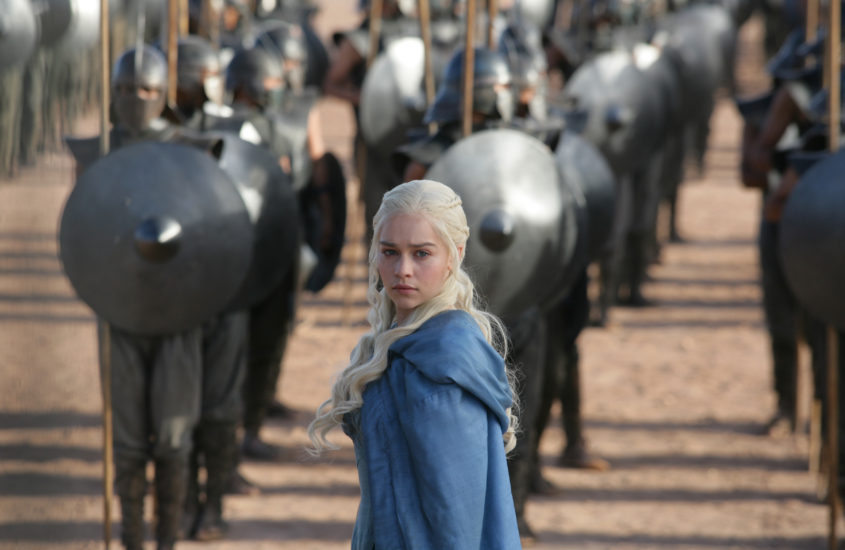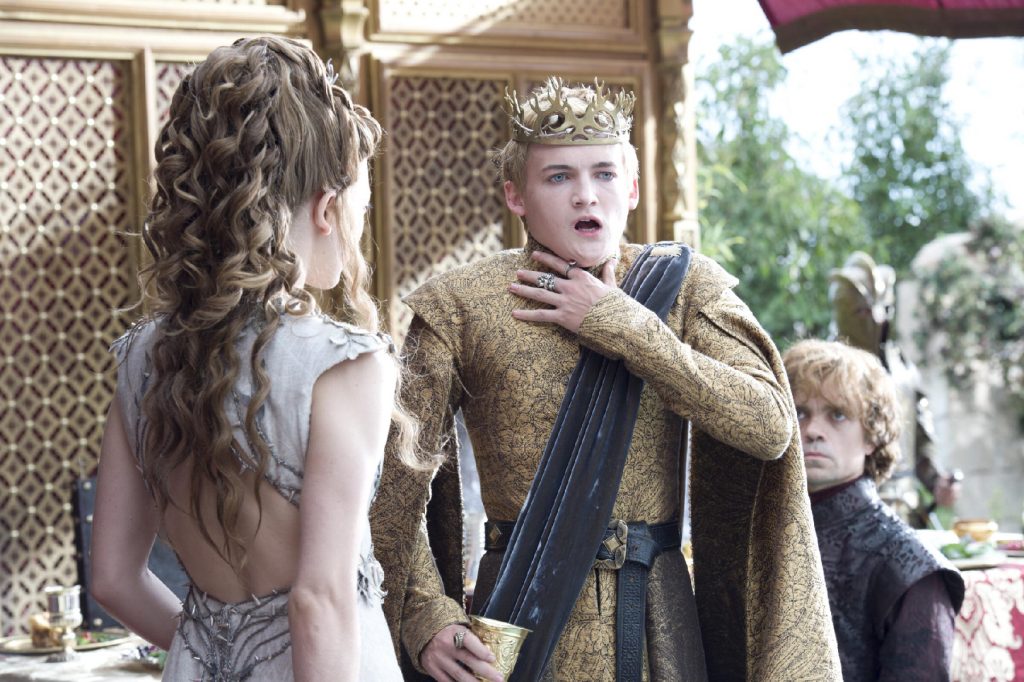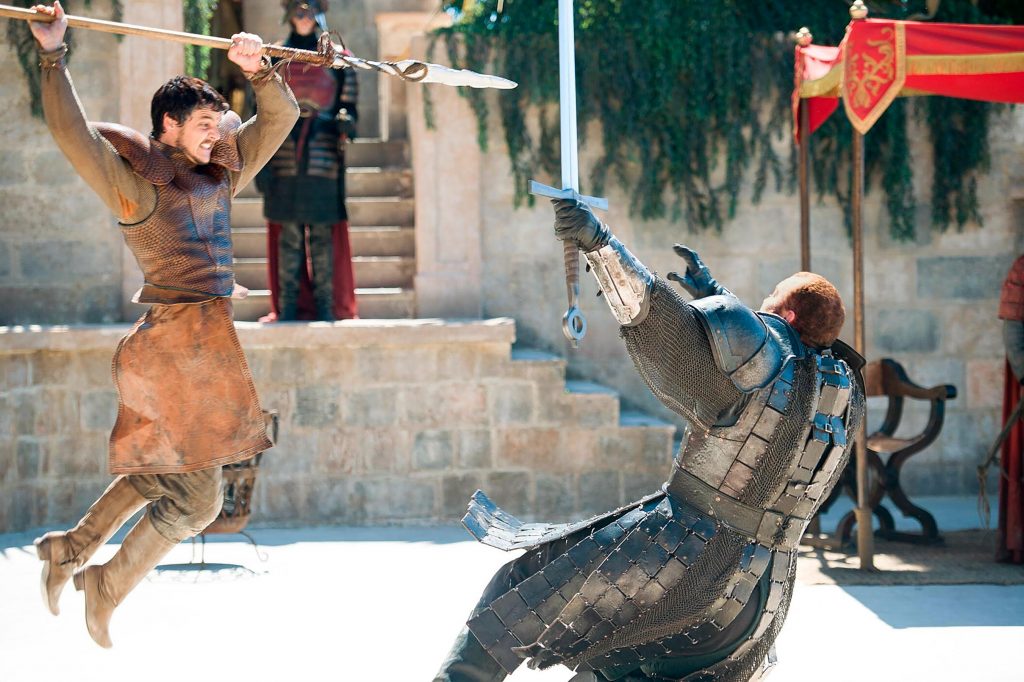Game Of Thrones Season Four Review By: Rose Heredia

This season had at least three climaxes in a row. Starting from episode seven to the season finale. I didn’t think I’d I’d be this surprised with the knowledge I did know of this show prior to watching. Each episode had me yelling “Ohh damn!” at any given moment. The sass, the shade, and the snark. Brilliant writing.
Sansa Stark was the MVP of season four. By episode eight, she had absorbed knowledge, strength, and manipulation after being surrounded by Cersei and Littlefinger for so long. She shouldn’t have been enduring all of this, but she had to get smart, or she’d keep getting manhandled by anyone as their pawn. She learns, mostly, how to handle Littlefinger because he’s shady McShaderson to the fullest. She surprises Littlefinger when she doesn’t rat him out to a heinous crime he commits. It’s lovely to watch her act, just like she’s watched him for the past three seasons. I was rooting for Sansa this season. Finally!

This brings me to the second episode of this season. Joffrey gets his just desserts! Spoiler alert: he meets his demise with poison. May I add that the whole episode leads us in a way that is rooting for his death because of his cruelty. During the wedding banquet after marrying Margaery Tyrell, he humiliates his uncle, Tyrion, by having him pour wine for him and making him work for it. Unfortunately, Tyrion is caught in the crosshairs of Joffrey’s death because Cersei automatically accuses him of killing her son. This scene – while satisfying seeing Joffrey perish – was also hard to see Tyrion get crapped on again. Tywin Lannister reminds him all the time that his wife is dead because of his birth and now because Cersei’s vision is blurred by her evilness, she automatically assumes Tyrion is behind the loss of her son. Since Season One, the fourth episode titled, “Cripples, Bastards, and Broken Things,” I’ve rooted for Tyrion even when he hasn’t made the best decisions. I, like him, root for those who should receive compassion, not disdain for their station in life. From that episode on, I’ve always supported Tyrion’s successes, no matter how small they’ve been. It’s hard to see him imprisoned here for the majority of the season.
Jon Snow, the Night Watch, and the Wildlings come to a head on this season. During last season, some men of the Night’s Watch let loose at Craster’s place, and the remaining men returned to inform the rest of the men at the Wall. After Jon Snow’s escapes from the hands of the Wildlings, Mance Rayder, the King beyond the Wall, managed to unite the tribes within the Wildlings to fight against the Night Watch. There’s an epic battle with casualties that occurs in episode nine and a beautiful slow-motion scene with Ygritte and Jon Snow. Because there are so many storylines to follow or to check in with, it’s always nice when the story slows down in a meaningful way, like here. While I enjoyed this scene, it was kinda cheesy, but I found it visually stunning anyway — the Wildlings future changes at the end of this season. Knowing the result of the series, I understand Jon Snow’s future even better at this season’s close.
Tommen Lannister is immediately crowned king after his brother’s untimely passing. He becomes a prop for the rest of his time on the show, and it’s obvious based on how both Cersei and Margaery treat him, which is why his story, which has more real estate in season five, is only a corner this season.
Other than the fight between the Night’s Watch and the Wildlings, the first climax arrives in episode eight. Tyrion chooses a trial by combat and Oberyn, from Dorne, steps in to fight the Mountain.

This fight is epic. Oberyn shouting at Mountain to say his sister’s name and to admit he raped and murdered her in repetition is the main reason for accepting this offer. He wants revenge. Very reminiscent of Inigo Montoya’s spiel in The Princess Bride: “Hello. My name is Inigo Montoya. You killed my father. Prepare to die.” While this fight is exponentially more brutal than funny and whimsical, this theme of vengeance is what connects these instances. In one scenario, our “hero” is triumphant and in another, not so much.

While everyone is fighting for the Throne and then some in King’s Landing, Daenerys is trying to make sure the slaves she freed stay liberated. In one instance, she says: “They have a choice. They can live in my new world and die in my new one.” Her tenacity to make sure these people stay free is noble and a reasonable cause. This is the first time I’ve wondered how she is depicted in the novels. While she wasn’t my favorite on the show and I was able to understand her actions, how exactly was she going to govern cities from afar after giving them their freedom? I saw her as America and an allegory for the 9/11 aftermath when the U.S. troops invaded Afghanistan. How did that work out? I liked that I was able to see this in her storyline, which makes me wonder about her at the series end. I’ll leave my thoughts about that during my season eight post. I respected her intention, but her follow through? Not so well thought out.
The conversations and double-crossing in this season astounded me in the best way. I think it’s very interesting watching these episodes with a semblance of how everything is going to end. I know vast chunks of the endgame here, so I’m mostly watching so those gaps are filled to explain how we got there like reading a story in media res and learning how we arrived in the current situation.
Those cliffhangers continue to a trend here, especially with the end of this season. That season finale is one of my favorite ones of the series. While we’ve seen a pattern of a massive climax in episode nine and feel the repercussions in the last chapter, many events unfold at the end of this episode, and again, it made me feel glad I was not watching this in real time.
What an excellent mid-series season!



